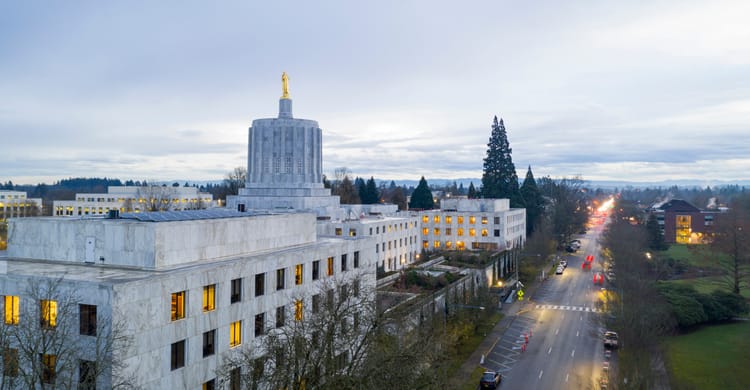Transportation Package, Redux, and Revenue Forecast

August is traditionally a slow month in the Capitol with the legislature already adjourned from its annual session. This week, however, lawmakers were unseasonably busy returning to attempt a mulligan transportation funding package and grasp the fiscal reality of the changing federal tax and spending landscape.
Lawmakers Convene in Special Session for Renewed Transportation Funding Proposal
During the final three weeks of the regular session, Democrats in the legislature unveiled an extensive list of transportation tax and fee increases to dig the Oregon Department of Transportation out of a structural budget deficit. Those proposals drew immense bipartisan skepticism, which killed the package during the session’s final day, leading to Gov. Tina Kotek (D) announcing one of the largest government layoffs in state history.
In late July, Gov. Kotek announced she would call lawmakers back into session over the Labor Day holiday weekend to consider another funding proposal to:
- Increase the gas tax from $0.40 to $0.46 per gallon
- Increase annual vehicle registrations fees and create new registration surcharges for electric and highly fuel-efficient vehicles
- Increase titling fees
- Double the statewide employee transit payroll tax from 0.1 to 0.2 percent
- Require owners of electric vehicles to report their annual miles or opt into a flat payment in lieu of reporting and paying for those miles (by 2031)
In all, the current funding proposal would raise roughly $5.8 billion over the next decade.
Although transportation funding in Oregon has traditionally been a bipartisan affair, Oregon Democrats are approaching this conversation as a one-sided negotiation within their own caucuses. While they have the supermajorities to raise taxes without any Republican votes, they need the support of all their members for a tax plan to cross the finish line. During the regular session, the unilateral nature of the transportation funding plan ended up becoming its death-knell. And it remains unclear if there is a path for a package to cross the finish line this time around.
Despite Republicans being largely removed from these talks, they are not idling through the session. Special sessions in Oregon are generally one-day events, with the policy and politics settled well before the session begins. It seems exceedingly unlikely for that to be the case with this special session. Unless they are invited to the negotiating table, Republicans do not intend to suspend the constitutional rules to fast-track parliamentary procedure. By rule, the chambers must first read (introduce), second read (notice), and third read (vote) on a bill on separate calendar days, absent a rules suspension. Republicans have suggested they will not suspend those parliamentary rules, dragging the session through the weekend and, likely, into next week.
The special session was scheduled to begin this morning; however, the chambers are already hitting speed bumps. In the Senate, Democrats did not have the votes necessary to approve the rules governing the special session, requiring them to postpone their procedures. And in the House, Democrats did not have enough members in attendance to conduct business, delaying the start of their work through at least the afternoon. These slow downs are occurring before Republicans even have a chance to start their stall tactics.
Lawmakers are in for a long weekend, just not the relaxing long weekend the rest of the country has planned.
Revenue Committees Briefed on the “One Big Beautiful Bill Act” (H.R. 1)
On Wednesday, the House and Senate tax-writing committees received the latest revenue forecast from the Office of Economist Analysis. While the national economy has proven resilient amid the trade war and federal policy, Oregon’s economic reality is an outlier as it faces deteriorating growth and rising unemployment. Over the last year, Oregon lost 24,000 jobs across a large swath of industrial sectors, especially manufacturing, far exceeding the slowdown previously predicted.

The state economists dedicated much of their presentation to H.R. 1, the “One Big Beautiful Bill,” and its impacts on state revenues. The federal legislation renews and, in some cases, makes permanent the tax cuts set to expire from the Tax Cuts & Jobs Act of 2017. As one of only five states without a general sales tax, Oregon’s revenue stream is reliant on income taxes, which use federal tax law as the starting point. This means the state’s primary funding mechanism is highly susceptible to changes in federal tax law.
Perhaps ironically, Democrats in the legislature spent most of the regular session concerned Congress would not pass a new tax law and renew those expiring tax cuts. While that law significantly cut federal taxes, it offset some of those costs by eliminating or limiting allowable deductions, which Oregon uses for its own income tax. Those offsets significantly raised state tax collections, with lawmakers told their expiration would result in a loss of nearly $500 million per biennium.
Although the new federal tax law achieved Oregon Democrats’ goal of renewing the tax policies from 2017, it also created new provisions that affect state revenues. These include new or enhanced deductions for overtime, tips, auto loan interest, business purchases, and research and development. According to the state and legislative economists, the additional tax cuts in the federal law amount to $888.2 million in less revenue for the state.
It is important to note the state is not facing a $888.2 million budget hole because of its connection to federal tax law. In crafting the final budgets for the biennium, the legislature set aside roughly $500 million as a cushion for potential federal actions. This results in a budget deficit of $372.7 million for the biennium, which will either need to be managed by cutting spending, raising taxes, or an economic boom that generates additional revenues.
While there is no shortage of “takes” on the state’s conformity to federal tax law — with some groups already trying to leverage budget fears to justify a special session to raise taxes — the reality is that lawmakers and staff need time to compile the information necessary to make informed decision. As much as some lawmakers and activists would like to think of taxes as a binary decision — taxes are good, taxes are bad — navigating the policy landscape is an entirely different ordeal. If Oregon makes irrational policy decisions, it could easily result in devastating, long-term ramifications for the economy.
Further, the state economists’ dire portrayal of the state economy elevates the need for the legislature to restrain itself from gut political reactions. If the state raises taxes, especially business taxes, it could amplify the downward trend for critical sectors, such as manufacturing and homebuilding, two sectors the state has expressed substantial interest in buoying in recent years. Lawmakers will need to chew gum and walk at the same time — navigating a challenging budget landscape without further deteriorating the state’s fragile economic climate.
There is little policy connection between the current special session on transportation funding and the new federal tax law. Politically, however, they are very much intertwined. If Democrats succeed in raising transportation taxes, then turning around and again raising taxes on a large swath of the economy could become a more challenging pitch within their caucuses, let alone voters. Additionally, if the narrative of the special revolves around the parliamentary potholes, it could dissuade Democrats from convening another special session on other taxes.





